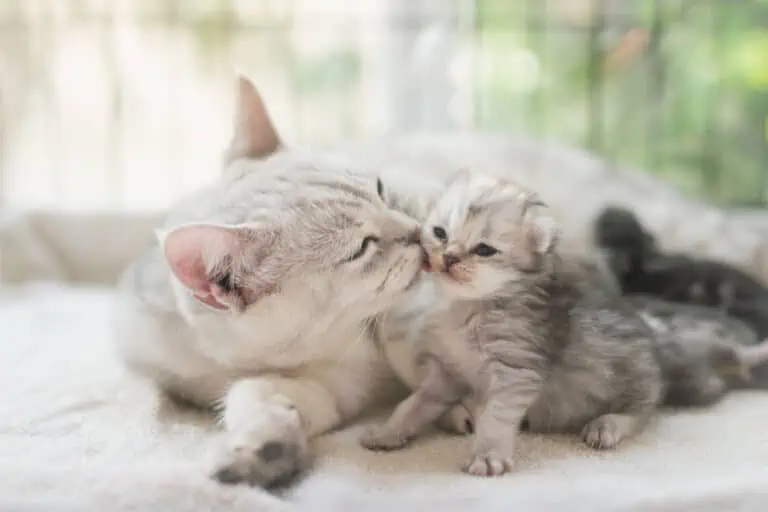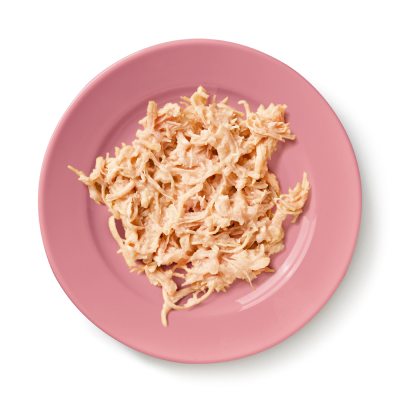-
Shop By Age
-
Kitten
Up to 1 year
-
Adult
1-6 years

When can my cat go outside after giving birth?
01/03/2024
Does your furry friend plead to go out at the same time every night?
If they are a twilight wanderer – meeting up with other felines on the block as they prowl their territory – giving birth to kittens can see this regular routine interrupted.
The main reason being, (cat)ernity brings with it a whole other schedule to stick to: namely, feeding newborns around-the-clock.
A cat can actually go outside 24 hours after giving birth, but you may want to wait, and make sure all is well with the kittens before letting your excitable explorer hit the streets once again.

What if my cat wants to stay inside after giving birth?
Cats can be mysterious, but much like humans, new mums probably won’t want to leave their babies’ side for the first few days. And that’s completely normal.
Your queen has her paws full guarding her litter, helping to regulate their body temperatures and feeding them every two to three hours. It can be exhausting.
However, if she seems lethargic, then check for other signs of uterine metritis, a severe uterus infection. The main symptom is a foul-smelling vaginal discharge after birth, but she might also have a fever, and her milk production might have slowed or stopped. The condition requires urgent veterinary treatment, possibly an emergency operation to be spayed.
What does ‘normal’ behaviour look like after a cat gives birth?
- Moving her kittens. Her natural mothering instincts could include licking and nuzzling her newborn kittens, and purring. She may move them if she feels unsafe or too cold. Allow her to do this, and provide a quiet, comfortable and warm area for her to move to, separate to the rest of the household.
- Overprotective. It is normal for a new mama to be overprotective of her spawn, especially if it’s her first litter. She might keep her distance from you or become uncharacteristically aggressive towards you or other pets. For this reason, it’s not a good idea to let her out just yet, especially as she will need at least 24 hours to recover from a smooth labour and at least a week if there were complications. Plus, an unneutered cat can fall pregnant again just two weeks after giving birth.
- Rejection. Sadly, it is not uncommon for mother cats to reject a kitten, or kittens. Put some birthing fluid on them to help her accept them. You might even need to help gently hand-rear them if mum is unwell or struggling. Be calm, quiet and only disturb them when absolutely necessary though.
- Mastitis. If your cat is refusing to let her kittens nurse, she could have mastitis – a serious bacterial infection of the milk ducts. Milk production blocked by inflamed mammary glands will leave her teats swollen, hot, and bruised. Your cat will require emergency veterinary care, usually antibiotics to fight the infection, and you may need to hand-feed the kittens while she recovers.
- Milk Fever. Milk fever symptoms may not be classed as ‘normal’ behaviour, but this rare condition is a veterinary emergency, brought on by calcium deficiency during birth or nursing, that all pet parents should be aware of. Look out for seizures, staggering, muscle by tremors, restlessness, and excessive panting.
- Give her space. Your cat may live a pampered life – the queen of the house – as you fulfil her every need. But suddenly, she’s in mum-mode, caring instinctively for her babies. Slight behaviour changes are common and likely to fade after a few weeks, so step back and give the new family some space. You can provide blankets, a heat lamp, or a heating pad to help the kittens stay warm whenever their mother leaves to eat or use the litter box.
Is it okay for my cat to take her kittens outside with her after giving birth?
Even cats that spend the vast majority of time indoors might attempt to take their kittens outside after birth. This can be because they see other pets in the home as a threat, and in order to protect their newborns from these ‘predators’, they will try and find somewhere safe to hide them.
A cat mum might also move her babies outdoors if eager pet-parents begin interfering too much, or the house is too bright, busy, or noisy.
The concern here is that she could actually be moving them into harm’s way, with all manner of dangers – from traffic and disease to other animals and chemicals – very real and potential threats.
At Applaws, we recommend keeping your kittens indoors until they are fully neutered and vaccinated. Six months is a good age to start letting them experience the great outdoors, but if you want to accompany them on some supervised trips outside first, when they are a little younger, then that should be fine.
Constant observation
Cats are creatures of habit, and so it may well be that mama is desperate to dive right back into her old routine straight away.
That’s absolutely fine, but it is vital she doesn’t leave her little bundles of joy too often in those early days. Kittens are completely dependent on their mother up until at least four weeks of age.
If all seems well after the first 24 hours – and there were no complications during labour – you can allow her out for a short supervised walk, but be sure to keep an eye out for any worrying postnatal conditions.







